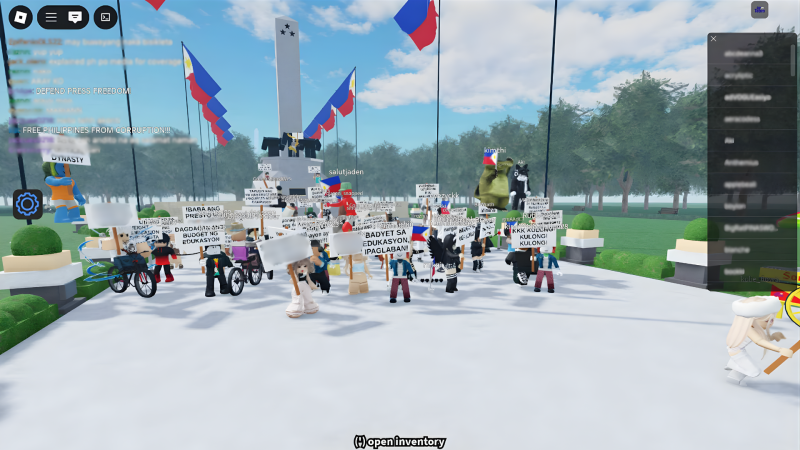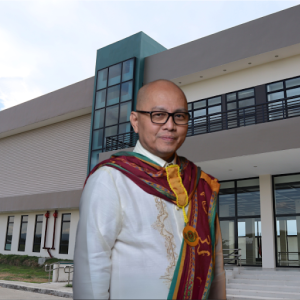Placards denouncing corruption, political dynasties, and budget cuts in education were being waved. It was a protest not on the streets but on an online platform. The days of digital student activism have arrived.
On 17 October 2025, the University of the Philippines Open University (UPOU) University Student Council (USC) organized in-game marches to denounce corruption and call for free, quality, nationalist education.
Where it All Happened
The virtual rally took place on Roblox, an online gaming platform that also allows users to make spaces and events that reflect social issues.
“Yes, it’s a gaming platform, although its experiences are specifically built on the premise of interaction and cooperation. It’s not a surprise to me that it also eventually became a space to mobilize,” said Flynn Gonzaga, a non-binary Bachelor of Arts in Multimedia Studies (BAMS) student.
Angela Joaquino, Bachelor of Education Studies (BES) student, explains, “Roblox is a popular platform that is also interactive; it is where the students could gather and demonstrate their stance. As a working student, I find this virtual movement inclusive and empowering, and it shows that activism is not limited to face-to-face or physical spaces. We can create an impact even if we support and attend online.”

Participants gather in the virtual rally. Screenshot by Alexa Andrea Cetron
Claiming Online Spaces for People’s Voices
Taking part in the online rally was both political and personal.
“We wanted to do something bigger, something better than a ‘DP blast’ on Facebook. We wanted to make a statement, let it be known that UPOU is never not active when it comes to the matters of the state,” said Kurt Cahanap, a third-year BES student.
Angela Joaquino, also from the BES program, took part in the rally for the sake of our country, as well as the e-Skolars. “I joined the Roblox rally because I could not join the onsite or walkout rally due to schedule reasons,” she said. “Through this, I realized that these digital spaces let us show that the people onsite are not the only ones angry about the government’s anomalies. Even online, we can be activists, and the distance learning students can take part virtually. It is a powerful way to show solidarity and raise awareness in the digital space.”
Gonzaga participated online after being unable to attend the on-site mobilization on 21 September and was inspired by the Roblox rallies held on the same date. Gonzaga explained, “I am extremely dissatisfied—to say the least—with our governance in the Philippines, and feel personally affected by existing policies and issues that have been set aside for too long, such as the DPWH flood control projects and the blatant disregard for implementation of the SOGIESC Bill, among others. I also like to express my thoughts through satire or humor, so being able to customize my avatar to match my views was especially enjoyable.”
For Alexa Andrea Cetron, a student leader pursuing BES, her drive and eagerness to use her platforms and voice motivated her to participate in the rally. “I believe in participating through these. I will slowly help the unseen or unheard Filipinos be finally recognized and reached out to, including the accountability that the government should first uphold and execute,” she said.
Cahanap also said that the event has also allowed the students to feel a sense of camaraderie and community. Gonzaga agreed, appreciating the opportunity to connect with fellow Filipinos from far-off places who shared the same beliefs.
Sense of Empowerment
For the older generations who grew up in the analogue era, an online rally might seem strange. For the new generation, it feels appropriate for the time.
“It feels surreal. Older generations may find it funny that we used a game to promote our concerns and grievances, but that’s exactly the point. We have reached this point in technology where what we do in the virtual world carries a weight in the real world,” Cahanap explained.
Students participating in the online rally felt feelings of elation and empowerment, contrary to the common perceptions of online platforms being too impersonal.
“I feel elated and further driven to serve the UPOU community and our country. Taking part in this new yet effective platform is truly a remarkable achievement in itself as a student and citizen of the Philippines,” Cetron said.
Joaquno added, “I feel empowered, and it is really fulfilling. Even though I wasn’t able to attend the protest on the street, I remember there were around 100 participants in the rally. The sense of unity and purpose was strong, especially when we did the march and all of us were holding placards.”
Erin Kate Obille, a BA Multimedia Studies student, found it very inspiring to see other people join the online rallies. “There’s a certain charm to mixing internet humor and genuine calls for accountability and transparency. There’s this certain impression that the “youth” are lazy and always caught up in their games and social media, but through this rally, we’re able to show that we can part in the national discussions,” she added.
While Gonzaga definitely enjoyed the experience, they also reflected on the experience as part of the broader tradition of student activism:
“I was included in national discourse, despite my limitations at the time. It gave me an affirmation that I was exuding honor and excellence in my own way. Personal validation aside, UP has a long-standing reputation for activism, and that’s for a good reason. As a state university funded by the Filipino people, it’s only right to give back, no matter how and where. In the [Committee on Elections], we use the motto “serve the people” and this mobilization was an exercise of that motto.
Blending Street and Online Activism
Widely covered by mainstream media, the 21 September protests are familiar to many. The recent online rally of UPOU students, however, shows that student activism has gone beyond the streets. In a digital world, these students are turning to online spaces as venues to express their views and participate in discussions on national issues.
Cahanap explains, “We’re integrating technology [in our lives] now more than ever. And technology is a fantastic platform to spread your message in a matter of seconds. It spreads awareness rapidly through social media platforms and online communities.”
Obille added that video games and the digital space are political and always have been. “They’re able to transcend the barriers of the real world,“ she added. “As students of Open University, it is also important that we acknowledge digital spaces as platforms for mass demonstrations. For example, there is a Minecraft world that archives banned books and thousands of Roblox players marched virtually for a Free Palestine. The digital space allows for people to take part in these movements despite physical restrictions.”
Rather than looking at each form of rallies as separate, the onsite and the online rallies can work together to advance the same cause. “Sure, we’re doing it in different mediums, but we still carry one message,” Cahanap added.
“It creates a broad movement that connects both forms of activism — physical and digital,” said Joaquino. Online rallies also make participation in such civic activities more inclusive. “It is inclusive in a way that even people who cannot attend physically can participate online,” she added.
“The digital age necessitates new forms of protest,” Gonzaga said. “There are many individuals, not just in the UPOU community, who are unable to attend physical protests for various reasons, but having these types of mass mobilizations allows for accessibility, which at its core, is for everyone and not just those with different physical abilities. For me, I am unable to attend most mass mobilizations on-site because I stay at home to care for my family as the most able-bodied.”
“These kinds of virtual demonstrations may be unusual to those who are used to the typical mobilizations on the streets,” Gonzaga added, “but it only strengthens the cause by allowing more people to join. It’s an extension. “
Written by Primo G. Garcia | Edited by Anna Cañas-Llamas









